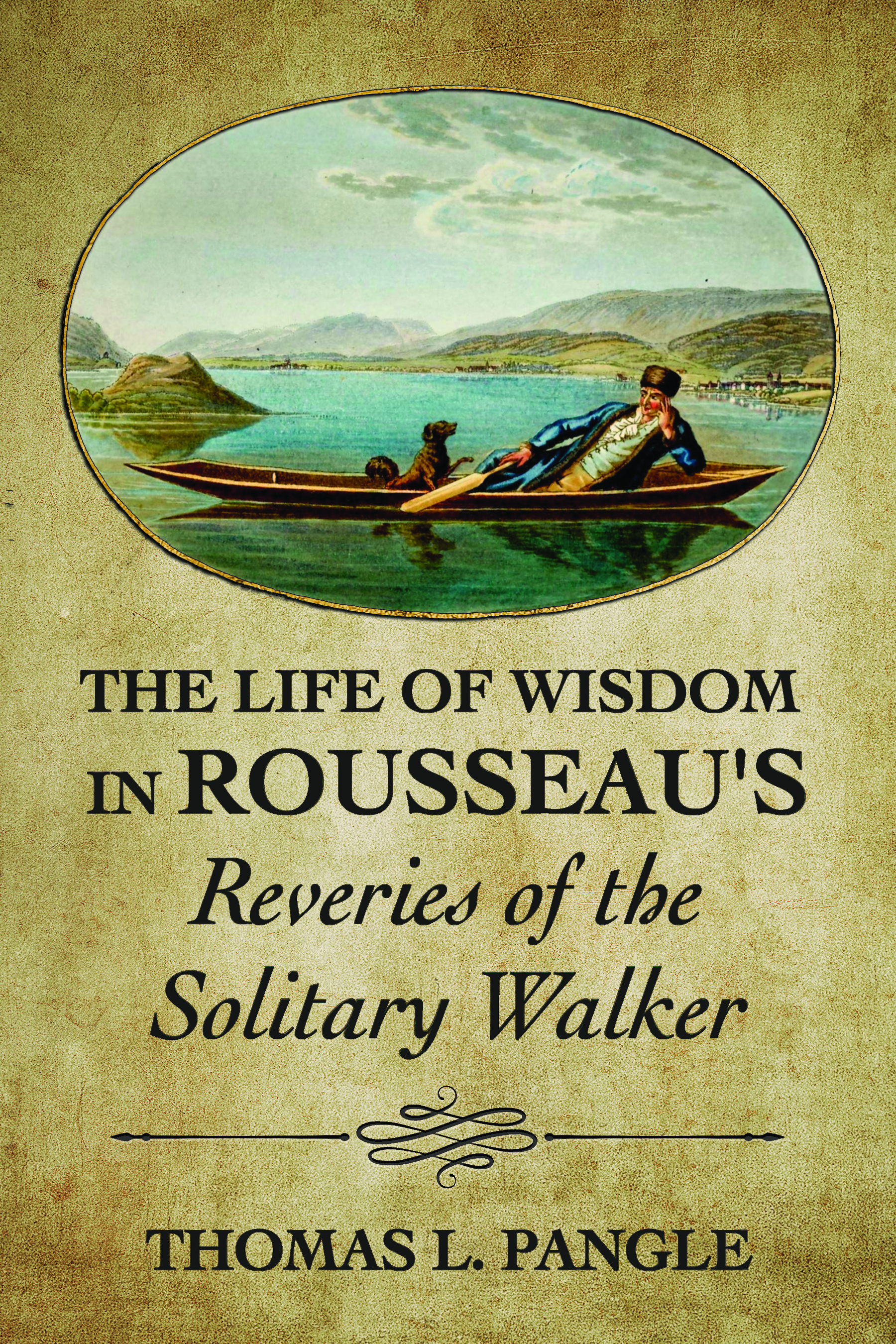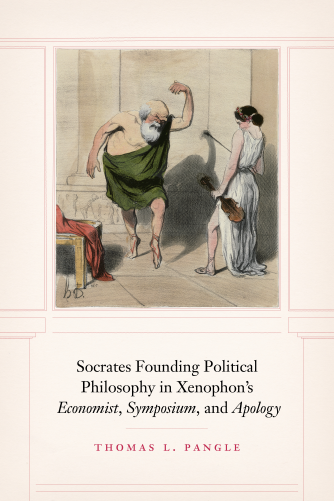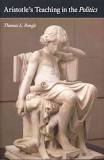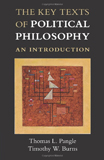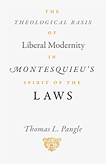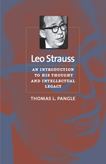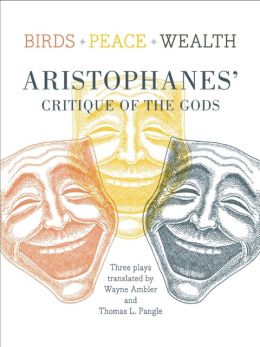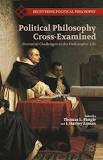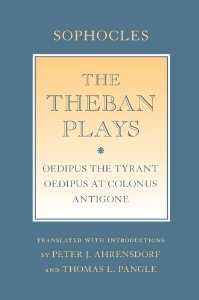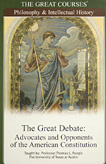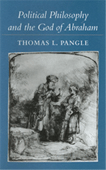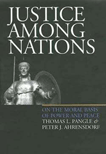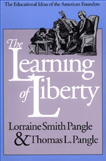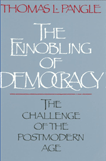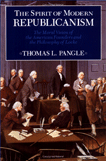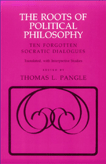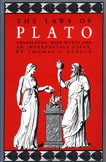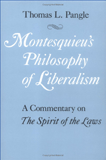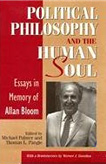• Home | • Curriculum Vitae: » PDF
Books and DVD by Thomas L. Pangle
2023
This book explains Rousseau’s most profound exploration and articulation of his own life, personality, soul, and thought as “the man of nature enlightened by reason.” Rousseau’s final work is shown to be the fullest embodiment of the experiential wisdom from which flows and to which points Rousseau’s political and moral philosophy, his theology, and his musical and literary art. The Reveries has been celebrated as a work of literature that is an acknowledged acme of French prose writing. Here it is argued that this aesthetic appreciation necessitates an in-depth interpretation of this writing’s complex and multi-leveled intended teaching—about the normatively best way of life.
2020
This book shows how the presentation of Socrates in Xenophon's highly defensive Memorabilia is decisively deepened as well as complemented by the less apologetic, more aggressive shorter writings that Xenophon devoted to portraying Socrates in action.
Xenophon's Economist exposes and focuses upon something scandalous about Socrates that one would never guess from reading the Memorabilia: well into his maturity, the philosopher by his own confession neither practiced nor understood "virtue" (aretē). Xenophon makes us witnesses to a dialogue where Socrates tells of the great day on which he underwent a radical transformation—when he became the moral and political citizen-philosopher famous to posterity, from having previously been a pre-Socratic thinker lost in the clouds, "reputed to engage in idle chatter and to measure the air," who by his own confession had no clue as to the meaning of the "noble/beautiful" (kalon), or as to what "gentlemen"—the "noble-and-good"—are and do.
Xenophon's Symposium lets us be "flies on the wall" at a private drinking party at which the character of Socrates, and of his not altogether harmonious circle, find expression through being portrayed as partaking in the playful posturing of conventional gentlemen in their cups. Gradual inebriation loosens the tongues of all present, including Socrates, making manifest the gulf—and how that gulf is tenuously bridged—between the erotic playfulness of conventionally respectable gentlemen (led by the famous, wealthy, and "upper-crust" Kallias) and the philosophically erotic playfulness of Socrates.
Xenophon's Apology of Socrates to the Jury gives us access to the inner deliberation by which Socrates arrived at his decision to give the astonishingly arrogant speech that he offered at his trial. Through an account of a crucial private conversation prior to the trial, in which Socrates reveals his plan for the conduct of his defense, and then through selections from Socrates's defiantly offensive courtroom oration, in which he provocatively proclaimed the excellences that made him superior to his fellowmen, Xenophon brings to light Socrates's distinctively philosophic self-esteem.
Xenophon's Economist exposes and focuses upon something scandalous about Socrates that one would never guess from reading the Memorabilia: well into his maturity, the philosopher by his own confession neither practiced nor understood "virtue" (aretē). Xenophon makes us witnesses to a dialogue where Socrates tells of the great day on which he underwent a radical transformation—when he became the moral and political citizen-philosopher famous to posterity, from having previously been a pre-Socratic thinker lost in the clouds, "reputed to engage in idle chatter and to measure the air," who by his own confession had no clue as to the meaning of the "noble/beautiful" (kalon), or as to what "gentlemen"—the "noble-and-good"—are and do.
Xenophon's Symposium lets us be "flies on the wall" at a private drinking party at which the character of Socrates, and of his not altogether harmonious circle, find expression through being portrayed as partaking in the playful posturing of conventional gentlemen in their cups. Gradual inebriation loosens the tongues of all present, including Socrates, making manifest the gulf—and how that gulf is tenuously bridged—between the erotic playfulness of conventionally respectable gentlemen (led by the famous, wealthy, and "upper-crust" Kallias) and the philosophically erotic playfulness of Socrates.
Xenophon's Apology of Socrates to the Jury gives us access to the inner deliberation by which Socrates arrived at his decision to give the astonishingly arrogant speech that he offered at his trial. Through an account of a crucial private conversation prior to the trial, in which Socrates reveals his plan for the conduct of his defense, and then through selections from Socrates's defiantly offensive courtroom oration, in which he provocatively proclaimed the excellences that made him superior to his fellowmen, Xenophon brings to light Socrates's distinctively philosophic self-esteem.
2018
This is the first book length study in English of the philosophic teaching of Xenophon’s masterwork. The first part analyzes Xenophon's defense of Socrates against the two charges of injustice for which he was convicted and put to death by democratic Athens: impiety, and corruption of the young. The second part analyzes Xenophon's account of how Socrates's life as a whole was just, in the sense of helping through his teaching a wide range of people.
2013
With the Politics, this book argues, Aristotle seeks to lead his students down a deliberately difficult path of critical thinking about civic republican life. He adopts a Socratic approach, encouraging his students–and readers–to become active participants in a dialogue. Seen from this perspective, features of the work that have perplexed previous commentators become perfectly comprehensible as artful devices of a didactic approach. Close and careful analysis shows that to understand the Politics, one must first appreciate how Aristotle's rhetorical strategy is inextricably entwined with the subject of his work.
2014
This book introduces readers to analytical interpretation of seminal writings and thinkers in the history of political thought, including Socrates, Plato, Aristotle, the Bible, Thomas Aquinas, Machiavelli, Bacon, Hobbes, Locke, Montesquieu, Rousseau, Tocqueville, Marx, and Nietzsche. Chronologically arranged, each chapter in the book is devoted to the work of a single thinker. The selected texts together engage with 2000 years of debate on fundamental questions, which include: What is the purpose of political life? What is the good life, for us as individuals, and for us as a political community? What is justice? What is a right? Do human beings have rights? What kinds of human virtues are there and which regimes best promote them? The difficulty of accessing the texts included in this volume is the result not only of their subtlety but also of the dramatic change in everyday life. The authors shed light on the texts' vocabulary and complexities of thought and help students understand and weigh the various interpretations of each philosopher's thought. • Accessible interpretive essays on the greatest texts in the history of political thought, from Plato to Nietzsche. • Includes key passage plus a succinct discussion that glosses the text, examines later-day interpretations, and guides students in forming their own interpretations. • Allows students to learn from, rather than only about, each thinker, and to apply their thought to the present day.
2010
How, if at all, can liberal rationalism validate its most basic normative premises in the face of illiberal, theocratic challenges premised on the authority of divine revelations which purport to override or to subordinate reason? This philosophic riddle is posed in the twenty-first century more acutely than it has ever been before. But the puzzle was originally confronted, and responded to with subtlety and power, in the writings of the political philosophers of the Enlightenment. This book offers a dramatic new interpretation, and subsequent critique, of the foundational, theologico-political teaching of what is by far the most comprehensive and influential of the treatises that laid the theoretical basis for our modern constitutional government. Montesquieu's didactic rhetorical strategy is explicated in light of the Frenchman's fraught historical context of authoritarian religious intolerance and persecution. Using this key to the sinuous way in which the Spirit of the Laws is written, this book proceeds to unlock the successive stages in the argumentation by which Montesquieu aims to dispose of the intellectual challenge from theocratic thinking.
2006
"It is both welcome and timely that a scholar of the stature of Thomas Pangle should address this subject and treat the topic in a detached and philosophical spirit. Not only is he one of the most accomplished political theorists in the world today, but he is also a leading student of the thought of Leo Strauss. The book, first and foremost an introduction to the political philosophy of Leo Strauss focusing on larger themes and questions, is readable and accessible to a general, higher-level intellectual audience."
-James W. Ceaser, University of Virginia
Birds, Peace, Wealth: Aristophanes' Critique of the Gods
2013
These three comedies provoke searching reflections on the religious nature of humanity: What are the psychological sources of piety? What is longed for in and through piety? What would a god need to be, to truly provide what our humanity seeks from divinity?
Aristophanes has been said to recreate the life of ancient Athens more convincingly than any other author.
Aristophanes has been said to recreate the life of ancient Athens more convincingly than any other author.
2013
Political societies frequently regard philosophers as potential threats to morality and religion and even subject these thinkers to the gravest inquisitions and indictments. Socrates was executed for disbelieving in the gods of Athens, Jean-Jacques Rousseau was charged with capital crimes for his anti-Christian teachings, Galileo Galilei was found "vehemently suspect" of heresy, compelled to recant, and sentenced to incarceration for life. The contributors to Political Philosophy Cross-Examined aspire to reopen the case for the philosophic way of life while fully appreciating the harsh attacks advanced by its most fervent detractors. In an age where extremist movements, existentialism, and postmodernist thought challenge the authority of reason, this book is a seminal contribution to current literature on philosophy, politics, history, classics, and religion alike.
2013
The timeless Theban tragedies of Sophocles—Oedipus the Tyrant, Oedipus at Colonus, and Antigone—have fascinated and moved audiences and readers across the ages with their haunting plots and their unforgettable heroes and heroines. Now, following the best texts faithfully, and translating the key moral, religious, and political terminology of the plays accurately and consistently, Peter J. Ahrensdorf and Thomas L. Pangle allow contemporary readers to study the most literally exact reproductions of precisely what Sophocles wrote, rendered in readily comprehensible English.
These translations enable readers to engage the Theban plays of Sophocles in their full, authentic complexity, and to study with precision the plays' profound and enduring human questions. In the preface, notes to the plays, and introductions, Ahrensdorf and Pangle supply critical historical, mythic, and linguistic background information, and highlight the moral, religious, political, philosophic, and psychological questions at the heart of each of the plays. Even readers unfamiliar with Greek drama will find what they need in order to experience, reflect on, and enjoy these towering works of classical literature.
2010
A collection of essays composed by students and friends of Thomas L. Pangle to honor his seminal work and outstanding guidance in the study of political philosophy. The contributors write in awareness that a loss of confidence in reason similar to the one we are witnessing today— when the desirability and possibility of guiding our lives by the enduring, normative truths that reason attempts to discover —had occurred at the time of Socrates, who realized that the existence of genuine limits to what is knowable by reason opened up thepossibility that our world, instead of having the kind of intelligible necessities that science seeks to uncover, could be the work of mysterious,creative gods or god—as devoutly religious citizens claimed it to be. His grasp of this great difficulty led him and his students—ancient and medieval—to attempt to ground the life of reason by means of a pre-philosophic, preliminary investigation of political-moral questions. Modern political philosophers later attempted to ground the life of reason in a considerably different, 'enlightening' way. These essays examine both of these attempts to answer the question of the right life for human beings, as those attempts are introduced and elaborated in the work of thinkers from Homer and Thucydides to Nietzsche and Charles Taylor. The volume is divided into five parts. The essays in Part I examine the moral-political problems through which Socrates came to ground the philosophic life as those problems first appeared in earlier, pre-Socratic writers. Part II explores those problems in their Platonic and Aristotelianpresentations, and in the work of two medieval thinkers. Part III addresses the thought of Leo Strauss, the thinker upon whose work the recovery of both ancient and modern political philosophy in our day has been made possible. Part IV explicates the writings of modern political philosophers and thinkers with a view to uncovering their alternative approach to science and political life. The volume concludes in Part V with essays addressing contemporary problemsenlightened by the study of political philosophy.
2006
Our constitutional tradition was born from a deep and intense contest of ideas between Federalists and Anti-Federalists. This course brings those conflicts back to life, inspiring one to rethink the fundamental opposing arguments and to re-enact the agonizing choices that were made by the generation that fought over and reluctantly ratified the Constitution--a document that was felt to be so unsatisfactory that it was immediately amended dramatically, by the addition of the Bill of Rights. Analysis of the issues at stake instills a new appreciation for the magnitude of the problems that the Founders and their opponents were wrestling with. The radicalism and the unprecedented character of the American constitutional republic becomes clear, and one begins to understand why so many thoughtful Americans at the time viewed the Constitution as a betrayal of the Revolution, and, indeed, of the whole previous western tradition of republicanism.
2003
"Like all of Thomas Pangle's work, Political Philosophy and the God of Abraham is stunningly erudite and discerning. Pangle makes splendid use of the great commentators and critics, listening to voices as diverse as the Rashi, Maimonides, Ibn Ezra, Calvin, Spinoza, and Kierkegaard, but Pangle's argument is very much his own. He is intellectually relentless, wrestling with titanic questions, arguing with elegance and clarity."
-Wilson Cary McWilliams, Rutgers University
co-authored with Peter J. Ahresndorf
1999
"A major contribution to the study both of international relations and the history of political philosophy. Filled with fresh and penetrating insights, it's easily the best and most comprehensive study of its kind."
-Carnes Lord, Fletcher School of Law and Diplomacy
co-authored with Lorraine Smith Pangle
1993
"This may be the best intellectual history of early America since Perry Miller's The New England Mind. It is a genuinely important book that could help guide us out of our present moral and civic morass.
-Journal of Church and State
1992
"The historical period we are entering looms as one of extraordinary opportunities for the moral as well as material betterment of humanity and, simultaneously, of deepening assault on civilized life. The more widely Pangle's powerful and penetrating Ennobling of Democracy is read and discussed, the better will be our chances for a wholesome outcome."
-Eugene Genovese
1988
"A work of extraordinary ambition, written with great intensity.... a trenchant analysis of Locke's writings, designed to demonstrate their remarkable originality and to clarify by doing so as much the objective predicament as the conscious intentions of the Founding fathers themselves."
-John Dunn, Times Higher Education Supplement
1987
"This book consists of literal English translations of ten Socratic dialogues that have been largely neglected for the last century.... Pangle offers a spirited criticism of arguments that have been adduced to support the view that some of the dialogues are counterfeit and shows in scrupulous detail why he believes in their authenticity...."
1979
"Pangle's edition of Plato's Laws will supersede all available translations. It is by far the most accurate rendition of the Laws into English that I have seen, far surpassing those of Bury, Taylor, and Saunders. Its note to the translations are thorough and helpful, bespeaking a wide familiarity with Greek literature and philosophy as well as with the contributions of modern classical philology. The interpretive essay shines with a lucidity that is admirable in view of this difficult and sometimes deliberately obscure dialogue."
-Western Political Quarterly
1973
"Pangle's brilliant explication is of monumental importance for the study of the roots of liberal democracy and the teaching of Montesquieu. Furthermore, Pangle demonstrates to the serious student how political philosophy should be studied."
-Virginia Quarterly Review
2010
"Anyone engaged in the study of Plato, or Homer, or the Bible, or (more generally) of the relationship between philosophy and religion, or of Tocqueville, or of philosophical novels such as Don Quixote and Flaubert's Sentimental Education, or of philosophical dramas such as Machiavelli's Mandragola and Lessing's Nathan the Wise, will find in this collection things worth reading. . . . A piece that is of striking quality is contributed by one of the editors, Thomas Pangle. His "The Hebrew Bible's Challenge to Political Philosophy: Some Introductory Reflections" contains enough wealth of observation and analysis to structure a respectable volume in itself."
—Canadian Journal of Political Science


